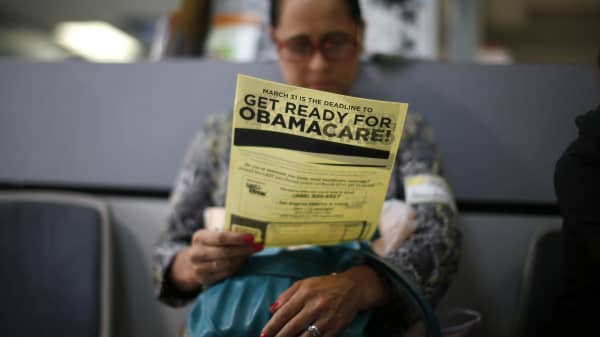The mandate has come under fire from all directions – detractors don't want it at all, while proponents of Obamacare think that if it was even higher it could have helped stem the recent tide of increasing premiums – but regardless, President-elect Trump has said he's getting rid of it.
Another thing that may go? Federal subsidies in the form of tax credits for low- and middle-income Americans. These subsidies were put in place to make health insurance more affordable; thanks in large part to federal subsidies, the Department of Health and Human Services says that 70 percent of shoppers should be able to get health insurance for under $75 a month, even with recent huge premium increases.
Then there are a few things that are more up in the air than others. Obamacare instituted some valuable consumer protections: like making every plan provide ten essential benefits (i.e., eliminating loopholes in coverage), prohibiting gender-based pricing and banning discrimination of people with preexisting conditions. Depending on the definition used for "preexisting conditions," that's between 36 million and 122 million adults who are eligible for coverage they would have been denied previously.
Will Trump's plan provide these same protections? It's hard to say, and even though he reiterated his desire to keep protection for preexisting conditions over the weekend, it seems inevitable that they'd be thrown out based on other parts of his proposal.
Repealing the individual mandate means that health insurance isn't required; without a large number of healthy people paying into the risk pool, either by buying their own insurance or paying the mandate, insurability for individuals with preexisting conditions becomes fiscally unfeasible. Under Trump's suggested plan we'd return to medically-underwritten discrimination against people with preexisting conditions, meaning that tens of millions of people end up right where they started before Obamacare: uninsured and unprotected.
What could take its place
Obviously, we don't know what will happen over the next four years. But we do have some glimpses into what Republicans want. One comes in the form of Paul Ryan's A Better Way plan. The other comes from Trump himself, and there are a few very important points to it.
When it comes to cost, Trump says he wants to make insurance more affordable through a few different means. First would be allowing the full deduction of health insurance premiums from taxes. That means that even if you aren't getting a tax credit, you can still combat costs with a sizeable tax deduction. (Many argue that this is a greater benefit to upper class citizens who are more likely to claim deductions on their taxes.)
Trump also wants to expand the availability of health savings accounts (HSAs). HSAs are currently available to high-deductible plan owners as a way to pay for qualified medical expenses with pre-tax money, again allowing for an offset of healthcare spending via tax savings. According to Trump, "HSAs should be tax-free and should be allowed to accumulate" and he wants to allow them to be passed on and inherited between family members.
Finally, Trump wants to combat high drug prices by allowing "entry into free markets for drug providers that offer safe, reliable and cheaper products." This will essentially open the import of medicine from overseas, ostensibly at a cheaper price than what American pharmaceutical companies offer.
Each of those points will definitely impact how a consumer pays for their health insurance, although the ultimate savings or costs remain to be seen. But the other major plank of Trump's platform might not have any impact at all: allowing insurers to sell across state lines.
If you've paid attention to health insurance recently, you may have noticed that it is sold in individual states. The Healthcare.gov and state exchanges will only sell to you if you're in the same state as your carrier. If you live in New York, for example, you can't buy from Blue Cross Blue Shield North Carolina.
Trump believes that by allowing insurers to sell across state lines, prices will drop thanks to increased competition. However, some experts believe this won't make a difference; they argue that insurers won't want to cross state lines because it's not the regulations but rather "setting up favorable contracts with doctors and hospitals so that customers will be able to get access to health care" in a new state is difficult and not worth the headache.
Would removing this regulation help lower cost? It's hard to say, because we don't really know if any insurer will actually want to try.
If we had a crystal ball – or more accurate polling – we'd be better prepared for the changes coming to Obamacare. We're looking at potentially a complete demolition rather than a few tweaks that we likely would have gotten with a Democratic victory. But that's no excuse to remain ignorant about health insurance. Now that you know what might be coming, there's no excuse to be left out in the cold.




